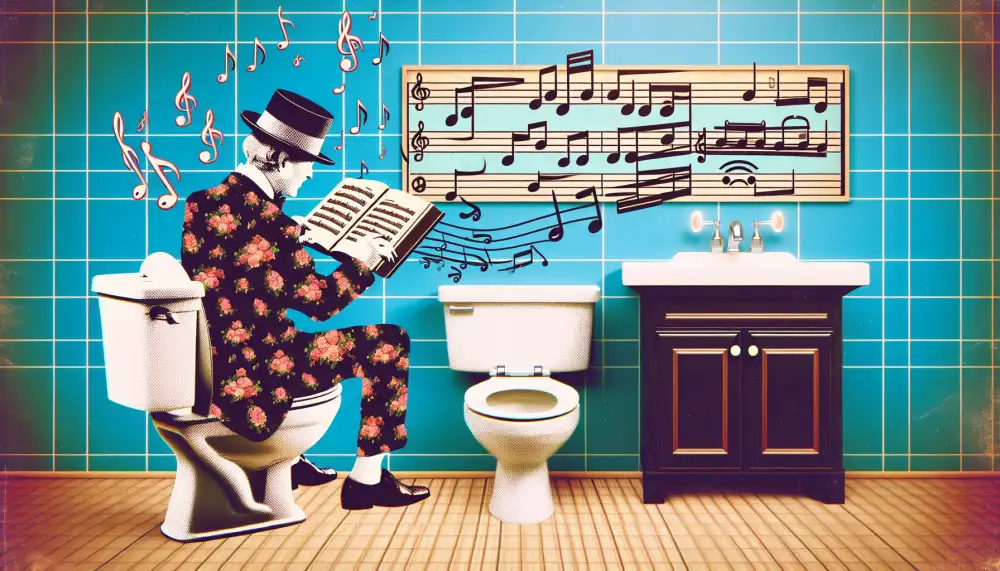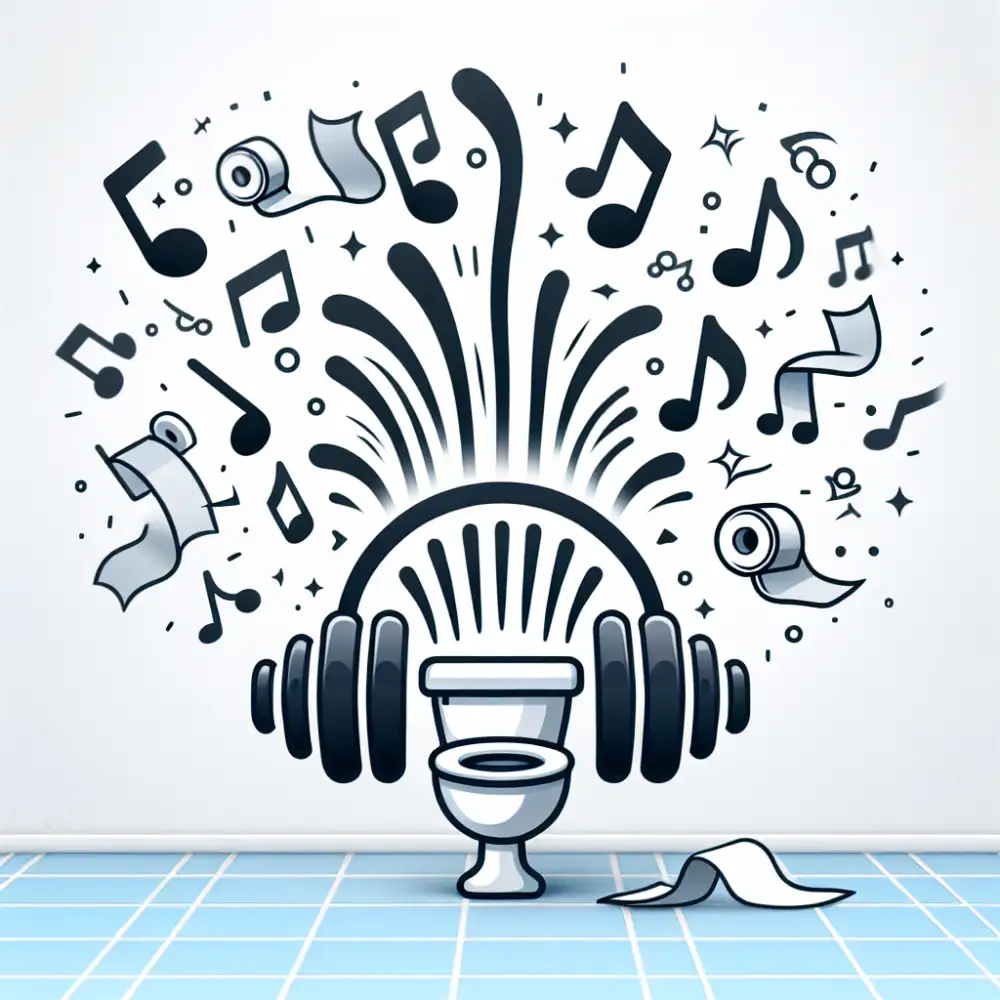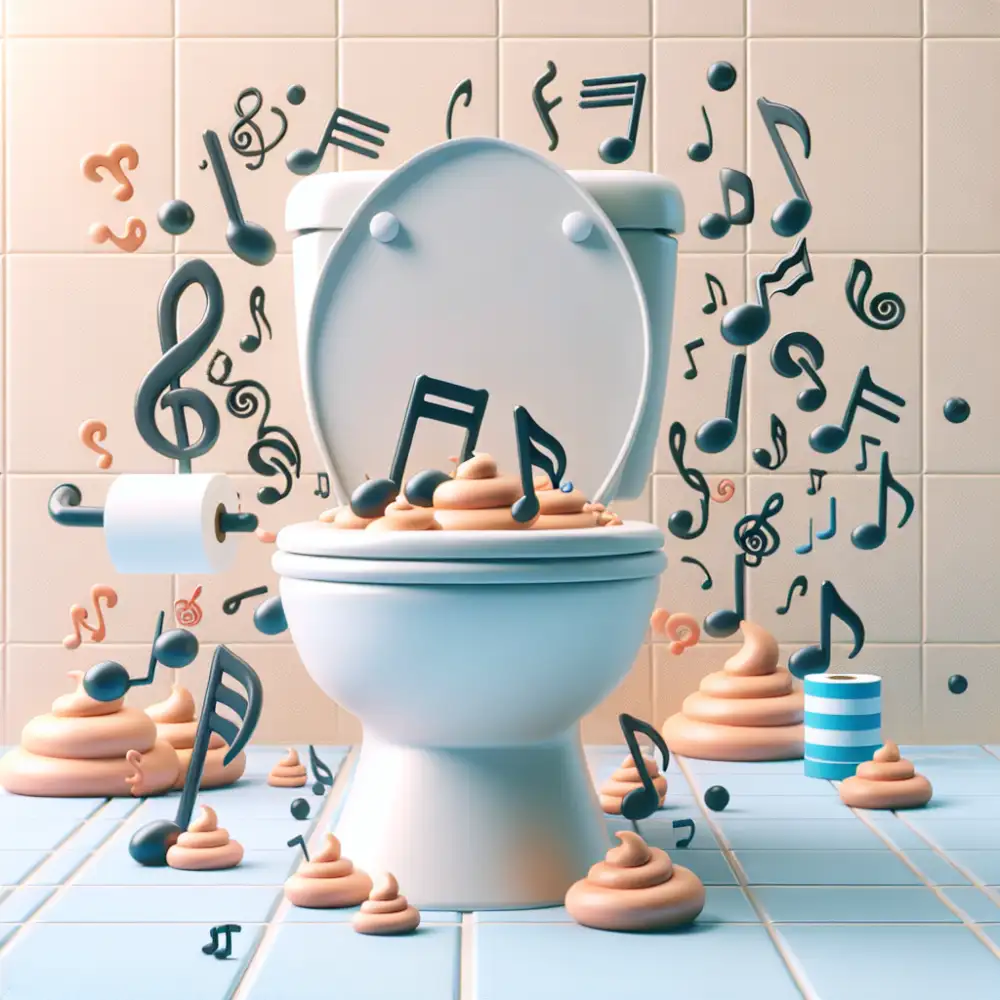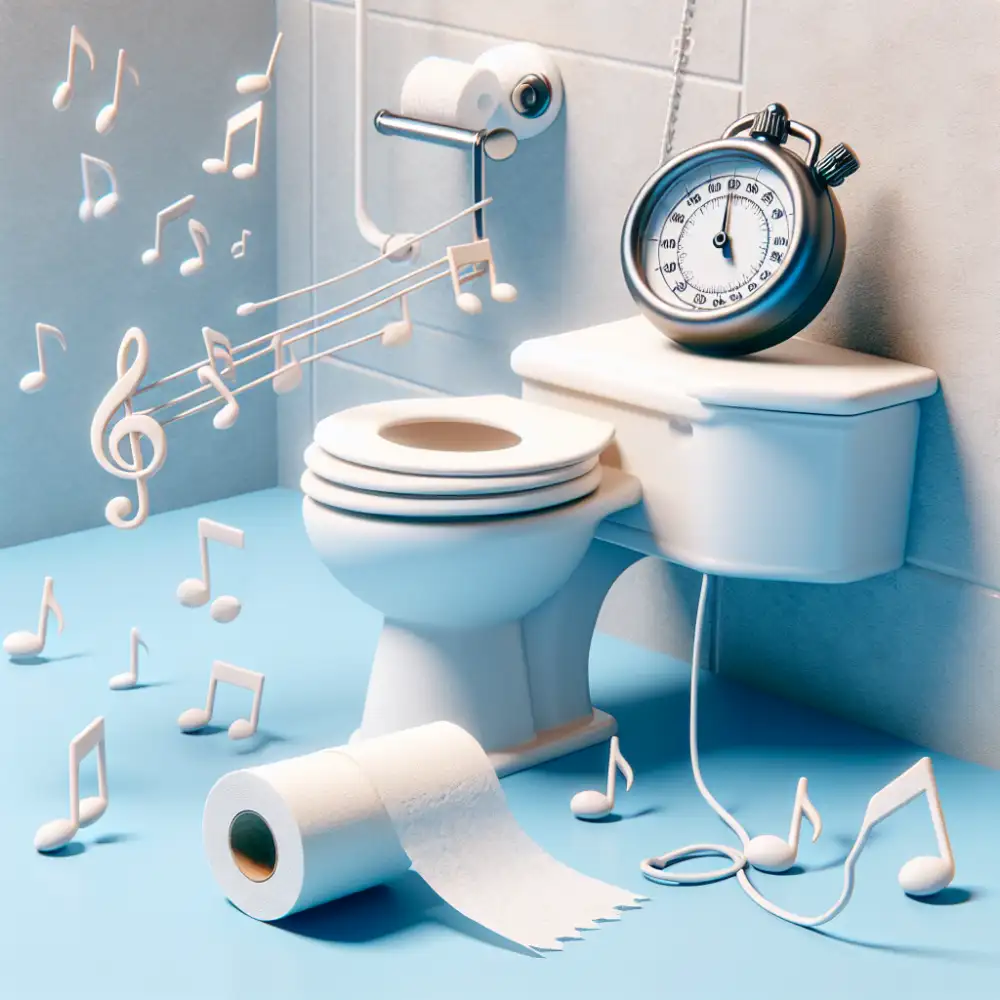Music That Makes You Poop: A Health Guide

- The science of sound and digestion
- Can music stimulate bowel movements?
- Genres and artists: anecdotal evidence
- The placebo effect and music
- Psychological impact of music
- Music therapy for constipation
- Scientific studies and limitations
- Other factors affecting bowel movements
- Tips for healthy digestion
- When to see a doctor
The science of sound and digestion
The idea that music can stimulate bowel movements is intriguing, but the science behind it is limited. Sound is processed by our brains, which can trigger various physical responses, including those related to digestion. Some research suggests that specific frequencies or rhythms might stimulate the vagus nerve, a major player in regulating digestive processes. This nerve runs from the brain to the gut and influences motility, the contractions that move food through the digestive system.
Theoretically, stimulating the vagus nerve through sound could potentially speed up or enhance these contractions, leading to bowel movements. However, there's no concrete evidence that listening to a particular song or genre can directly cause you to poop. While some individuals might find that certain types of music seem to coincide with bowel movements, this is likely due to personal associations, placebo effect, or simply coincidental timing.
Digestion is a complex process influenced by numerous factors, including diet, stress, hydration, and gut bacteria. Music might play a small role in this intricate system, but more research is needed to understand its potential effects fully.
Can music stimulate bowel movements?
While the idea of music making you poop might seem amusing, there's no scientific evidence to suggest that specific music can directly stimulate bowel movements. Bowel movements are primarily regulated by the digestive system's muscles and nerves, influenced by factors like diet, hydration, and physical activity.
Music, however, can indirectly influence our bodies in ways that might be mistakenly attributed to bowel stimulation. Calming music, for instance, can promote relaxation and reduce stress, which might indirectly ease tension in the body, including the digestive tract. Conversely, loud, upbeat music might energize some people, potentially leading to increased movement and activity, which could indirectly contribute to bowel activity.
It's important to remember that everyone's body responds differently to music and other stimuli. What might seem to trigger a bowel movement in one person might have no effect on another. If you're experiencing persistent bowel issues, it's essential to consult a healthcare professional to rule out any underlying medical conditions.
Genres and artists: anecdotal evidence
Anecdotally, certain genres and artists seem to “move” people more than others. Heavy metal, with its intense drumming and driving riffs, frequently tops fan-made lists. Bands like Metallica, Slayer, and Cannibal Corpse are often cited for their, shall we say, “digestive” qualities. On the other end of the spectrum, classical music and its soothing melodies are sometimes hailed for their ability to get things flowing. Mozart, Bach, and Beethoven are frequently mentioned in this context.

However, it’s crucial to remember that everyone’s musical taste and, more importantly, their physiology are different. What might get one person’s bowels rocking might do nothing for another. This is where the lack of scientific research becomes particularly noticeable. While we have mountains of anecdotal evidence and humorous online discussions, we lack concrete data to confirm or deny these musical myths.
The placebo effect and music
The power of the placebo effect is well-documented, influencing our perception of pain, mood, and even physical symptoms. But can music, with its ability to evoke strong emotions and physiological responses, tap into this phenomenon and affect our bowel movements? Anecdotally, many people swear by certain genres or artists that "get things moving." Perhaps it's the rhythmic vibrations of bass-heavy music or the stimulating effect of upbeat tempos. While personal experiences offer intriguing clues, scientific research on music's direct influence on bowel activity is limited.
There's a difference between a song coincidentally aligning with a pre-existing urge and music actively stimulating bowel movements. Our bodies have natural rhythms, and sometimes, a song's tempo might seem to synchronize with our gut, leading to a perceived connection.
While we await more scientific exploration on this specific topic, it's important to approach claims of "poop-inducing music" with a healthy dose of skepticism. The experience likely varies greatly between individuals, influenced by personal preferences, cultural associations, and even the specific circumstances surrounding music listening.
Psychological impact of music
Music has a powerful effect on our emotions, but did you know it can also influence our bowels? While it might sound amusing, the idea of "poop music" isn't entirely unfounded. Our digestive system is controlled by the autonomic nervous system, which also responds to external stimuli like sound. Certain types of music, particularly those with low-frequency vibrations and rhythmic patterns, can stimulate the vagus nerve. This nerve plays a crucial role in digestion, and its stimulation can increase intestinal motility, potentially leading to bowel movements.
Think about it: fast, upbeat music can make you feel energized, while slower, more calming music can aid relaxation. Similarly, certain sound frequencies might subtly influence the digestive process. However, it's important to note that there's no specific genre or song scientifically proven to induce bowel movements. The effect of music on digestion is likely subjective and varies greatly between individuals. While some people might find certain music helpful for regularity, others might not experience any noticeable effect.

More research is needed to understand the complex relationship between music, the nervous system, and digestion fully. So, the next time you're struggling with digestive issues, putting on some music might not be a bad idea. Just don't expect a miracle cure, and always consult a healthcare professional for persistent problems.
Music therapy for constipation
While the idea of music making you poop might sound amusing, there's no scientific evidence to suggest that certain music can directly stimulate bowel movements. Constipation is a complex issue often caused by factors like diet, hydration, medication, and underlying medical conditions.
Music, however, can play an indirect role in potentially easing constipation, but not in the way you might think. Music therapy, a recognized field that uses music to address physical, emotional, and cognitive needs, can be helpful. Music can reduce stress and anxiety, which are known to contribute to constipation. When we're stressed, our bodies go into "fight or flight" mode, diverting blood flow away from digestion.
Listening to calming music or engaging in music-making activities can promote relaxation and counteract this stress response. This relaxation effect might indirectly help ease constipation for some individuals. It's important to remember that music therapy should be used as a complementary approach alongside proven methods for constipation relief, such as:
Increasing fiber intake
Staying hydrated
Regular exercise
Consulting a healthcare professional
If you're experiencing persistent constipation, it's crucial to seek guidance from a doctor to rule out any underlying medical conditions.
Scientific studies and limitations
While anecdotal evidence abounds about music's ability to get things moving in the digestive department, scientific research in this area is surprisingly limited. There haven't been large-scale studies specifically investigating the link between certain music genres and bowel movements.
This lack of research stems from several factors. Firstly, studying bowel activity is complex and can be seen as a sensitive topic for participants. Secondly, musical taste is highly subjective, making it difficult to design studies with universally appealing or repulsive sounds. What might be relaxing to one person could be irritating to another, confounding potential results.
Furthermore, bowel movements are influenced by a complex interplay of factors beyond just sound. Diet, hydration, stress levels, physical activity, and underlying medical conditions all play significant roles. Isolating the specific impact of music on this process would be challenging.
While we may not have definitive scientific proof yet, the abundance of anecdotal experiences suggests that there might be something to the idea of music influencing bowel movements. Further research is needed to explore this potential connection and understand the underlying mechanisms at play.


Other factors affecting bowel movements
While listening to music can be a fun experiment, it's important to remember that individual responses to music can vary greatly. What makes one person need to go might not have the same effect on another. This is because bowel movements are influenced by a complex interplay of factors beyond just what we hear.
Our digestive system is controlled by a network of nerves, hormones, and muscles. Stress, for example, can directly impact this system, leading to either constipation or diarrhea. Similarly, what we eat and drink plays a crucial role. Fiber adds bulk to our stool, making it easier to pass, while staying hydrated is essential for smooth digestion.
Physical activity is another key factor. Regular exercise helps stimulate the muscles in our digestive tract, keeping things moving along. On the other hand, a sedentary lifestyle can slow down bowel movements. Certain medications, underlying medical conditions, and even travel can also impact our bathroom habits.
Therefore, while music might offer a temporary distraction or even a bit of a digestive nudge for some, it's crucial to address the underlying factors influencing your bowel movements for long-term digestive health. If you experience persistent changes in your bowel habits, it's always best to consult a healthcare professional to rule out any underlying medical conditions.
Tips for healthy digestion
While the idea of music making you poop might seem amusing, there's limited scientific evidence to support this. Digestion is a complex process influenced by various factors like diet, hydration, physical activity, and gut bacteria. However, music does impact our mood and stress levels, which can indirectly affect digestion.
Relaxing music can help lower stress hormones, potentially aiding digestion. When stressed, our bodies prioritize the "fight or flight" response, diverting blood flow away from the digestive system. This can lead to digestive discomfort. By reducing stress, calming music might indirectly promote smoother digestion.
However, there's no specific genre or artist proven to induce bowel movements. Focus on creating a relaxing environment during meals and incorporating proven methods for healthy digestion:

- Consume a balanced diet rich in fiber.
- Stay adequately hydrated.
- Engage in regular physical activity.
- Manage stress through relaxation techniques like deep breathing or meditation.
If you experience persistent digestive issues, consult a healthcare professional for personalized advice.
When to see a doctor
While listening to music can be a relaxing experience, it's not a substitute for professional medical advice. If you're experiencing persistent changes in your bowel movements, it's essential to consult a doctor. This is particularly important if you're experiencing:
Sudden or unexplained changes in bowel habits
Blood in your stool
Unexplained abdominal pain
Unintended weight loss
Severe constipation or diarrhea
These symptoms could indicate an underlying medical condition that requires attention. Your doctor can help determine the cause of your symptoms and recommend appropriate treatment options. Remember, self-treating can be dangerous, and seeking professional medical advice is crucial for your health and well-being.
Published: 27. 06. 2024
Category: Food



